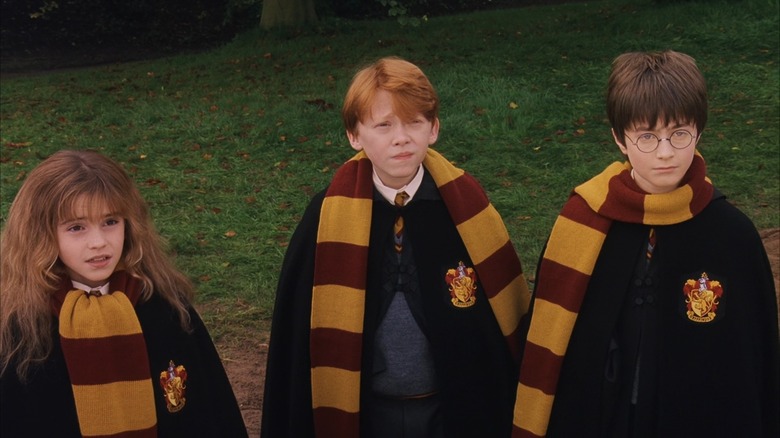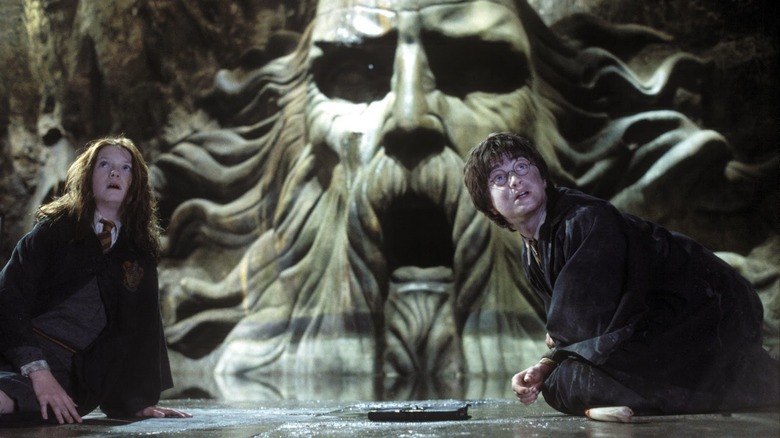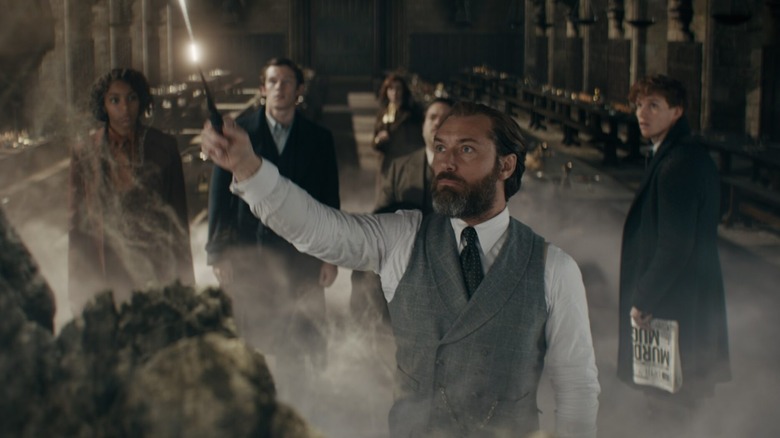The Correct Order To Watch The Harry Potter Movies
The first book in the Harry Potter series, "Harry Potter and the Philosopher's Stone" ("Sorcerer's Stone" here in the States) was first published in June of 1997. It was written by author J.K. Rowling, long before she had been driven mad by an infuriating streak of unabashed transphobia that she insists on adhering to. Thanks to years of bigoted screaming, Rowling's legacy has been wholly tainted, and it's hard to read her lighthearted children's fantasy books without thinking of her poisonous worldview. If one checks out the Harry Potter books from the library, however, one can still enjoy the adventures and complex Wizarding World of Harry Potter without giving Rowling another dime.
Before her mind snapped open in public, however, the Harry Potter books — and their subsequent movie adaptations — were widely beloved. The title character was an impoverished 11-year-old who was forced to live in a closet with his abusive aunt and uncle. His parents had died when he was a baby, and Harry held little hope for the future. Then, out of the blue — literally, as it comes in the talons of an owl — Harry is given a letter informing him that he is to attend a boarding school called Hogwarts School of Witchcraft and Wizardry. It seems that Harry was secretly the child of a wealthy witch and a wizard, and can escape his dark world into a secret universe of wonderment and wands.
The first Harry Potter movie was released in 2001 and starred Daniel Radcliffe as the titular boy wizard. Harry would ultimately appear in eight feature films before the series spun off into a trio of unpopular prequels set before the birth of Harry's dead parents.
Here's a handy-dandy guide to the 11 Harry Potter movies to date:
The release order
Like the books, each installment in the Harry Potter series represents one year of school at Hogwarts. This means Harry is 11 years old in the first film and 17 by the last one. The seventh and eighth movies are a two-part extrapolation of the seventh book and are fittingly titled "Part 1" and "Part 2." The ninth, tenth, and eleventh films are based on an in-universe textbook called "Fantastic Beasts and Where to Find Them," written by Rowling and published in 2001. The fictional author of "Fantastic Beasts" inside the Harry Potter universe is named Newt Scamander, and the three "Fantastic Beasts" movies are wholly original screenplays about that character. They are set in the 1920s, whereas the Harry Potter films are set in the present.
The films were released in the following order:
- "Harry Potter and the Philosopher's Stone" (2001) (called "Harry Potter and the Sorcerer's Stone" in North America)
- "Harry Potter and the Chamber of Secrets" (2002)
- "Harry Potter and the Prisoner of Azkaban" (2004)
- "Harry Potter and the Goblet of Fire" (2005)
- "Harry Potter and the Order of the Phoenix" (2007)
- "Harry Potter and the Half-Blood Prince" (2009)
- "Harry Potter and the Deathly Hallows — Part 1" (2010)
- "Harry Potter and the Deathly Hallows — Part 2" (2011)
- "Fantastic Beasts and Where to Find Them" (2016)
- "Fantastic Beasts: The Crimes of Grindelwald" (2018)
- "Fantastic Beasts: The Secrets of Dumbledore" (2022)
The first two films were directed by Chris Columbus, the third by Alfonso Cuarón, the fourth by Mike Newell, and the other seven all by David Yates. All but "Order of the Phoenix," "Where to Find Them," and "Crimes of Grindelwald" were written by Oscar-nominated screenwriter Steve Kloves.
There were supposed to be five "Beasts" movies, but interest has come to a dead halt.
Harry Potter homework
While I have seen all 11 of the Harry Potter movies, and I have visited the Wizarding World section of Universal Studios Hollywood, I have yet to crack open one of Rowling's novels. This, I found, was a detriment while watching the movies. The first four movies are all clear in terms of storytelling, and do a marvelous job of establishing characters and rules, laying out all the minutiae of the massively complicated Wizarding World pretty clearly. There is only one moment at the end of "The Prisoner of Azkaban" that makes little sense without the pretense of the novel, namely: why was there suddenly a magical stag by the lake? It's a mystery that won't be explained for two more films. But for the most part, the first four movies are clear and require no homework. For my money, the first two are, far and away, the best in the series.
From "The Order of the Phoenix" on, however, the Harry Potter movies become incredibly busy and confusing. Plot points are introduced in a hurry, supporting players seem to manifest out of nowhere (Ron Weasley has how many brothers?), and the actual filmmaking becomes muddy and baffling. It's clear that the filmmakers — from film number 5 onward — assumed viewers were intimately familiar with the books, and settled on merely dramatizing literary moments without any attention paid to cinematic acumen.
In brief, to merely understand "Order of the Phoenix" through "Deathly Hallows — Part 2," one will need to read the books first. Sadly, nothing will help you understand the confusing "Fantastic Beasts" movies. Or you can merely watch the four first movies and leave well enough alone. Those are the best ones after all.
Get them from the library. Give Rowling no cash.


